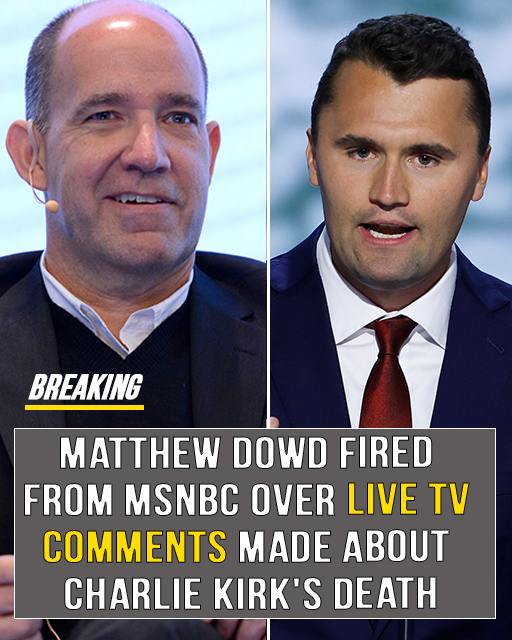The sudden and tragic passing of conservative activist Charlie Kirk has shaken the nation. At just 31 years old, Kirk had built a powerful platform as co-founder of Turning Point USA, traveling the country to speak with students, host debates, and champion the conservative movement. His untimely death left family, friends, and political leaders in mourning — but it also set off a wave of controversy that now surrounds one of the nation’s largest news networks.
This week, MSNBC analyst Matthew Dowd was dismissed from his role after making on-air comments about Kirk during breaking news coverage. His remarks, viewed by many as insensitive and inappropriate, have reignited ongoing debates about media responsibility, political division, and how the press handles moments of national grief.
For many Americans, particularly seniors who have witnessed decades of political change and media evolution, this story cuts deep. It’s not only about the loss of a young figure in U.S. politics, but also about the ways television networks shape the tone of national conversation in moments of tragedy.
A Shock That Reverberated Across the Nation
Charlie Kirk was no ordinary commentator. Born with a drive to make his mark, he co-founded Turning Point USA as a teenager and turned it into a leading force for conservative youth. His speeches and writings often stirred passionate debate, drawing both admiration and criticism.
His death during a public appearance in Utah left many Americans stunned. Within hours, tributes poured in from across the political spectrum. Donald Trump was among the first to release a statement, calling him “the great, and even legendary, Charlie Kirk” and praising his ability to connect with the nation’s young people.
“Charlie, we love you,” Trump wrote, extending his condolences to Kirk’s wife, Erika, and their family. For seniors who have watched generations of political leaders rise and fall, Trump’s heartfelt words carried the unmistakable tone of personal loss.
Media Under Fire for Coverage
As news spread, many television outlets scrambled to cover the tragedy. But while some provided solemn reflections, others stumbled in ways that drew public backlash.
Celebrity news outlet TMZ faced sharp criticism after viewers heard laughter in the background of a live report about Kirk’s death. The network quickly issued an apology, explaining the laughter was directed at an unrelated video — but the damage was done, leaving many questioning professionalism in moments of grief.
The bigger storm, however, fell on MSNBC, where analyst Matthew Dowd was asked to reflect on the environment that may have contributed to the tragedy. Instead of focusing solely on the loss, Dowd connected Kirk’s death to his own controversial views of Kirk’s rhetoric.
The Remarks That Sparked a Firestorm
On live television, Dowd described Kirk as “one of the most divisive younger figures,” suggesting his outspoken style contributed to a broader environment of hostility in American politics.
“Hateful thoughts lead to hateful words, which then lead to hateful actions,” Dowd said. “That is the environment we are in.”
For many viewers, the comments crossed a line. Social media erupted with criticism, accusing the analyst of showing insensitivity at a time when the focus should have been on mourning the loss of life.
MSNBC Responds Swiftly
The backlash was swift, and so was the network’s response. Rebecca Kutler, president of MSNBC, issued a statement condemning Dowd’s remarks.
“During our breaking news coverage of the death of Charlie Kirk, Matthew Dowd made comments that were inappropriate, insensitive, and unacceptable,” she said. “We apologize for his statements, as has he. There is no place for violence in America, political or otherwise.”
Within hours, news broke that Dowd had been fired from his position. The decision underscored the seriousness with which networks now view on-air commentary, particularly during moments of national mourning.
